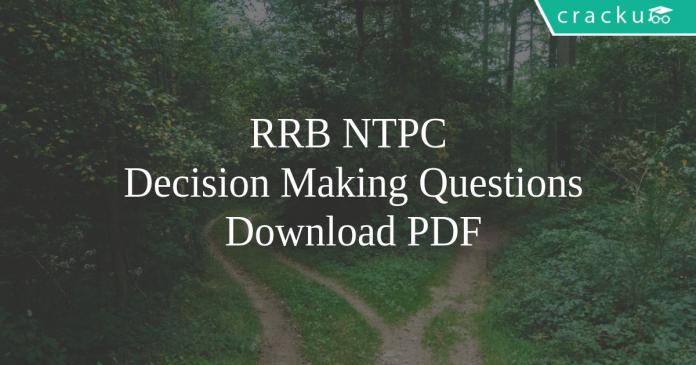RRB NTPC Decision Making Questions PDF
Download RRB NTPC Decision Making Questions and Answers PDF. Top 20 RRB NTPC Decision Making questions based on asked questions in previous exam papers very important for the Railway NTPC exam.
Download RRB NTPC Decision Making Questions PDF
Take a free mock test for RRB NTPC
Download RRB NTPC Previous Papers PDF
Instructions
In each question given below a statement is followed by three Courses of action numbered I, II and III. A course of action is a step or administrative decision to be taken for improvement follow up or further action in regard to the problem, policy etc. on the basis of the information given in the statement. You have to assume every thing in the statement to be true, then decide which of the three given/ suggested Courses of action logically follows for pursuing and decide the answer.
Question 1: Statement :
The chairman of the car company announced in the meeting that all trials of its first product the new car model ‘M’ are over and company plans to launch its car in the market after six months.
Courses of action :
(I) The network of dealers is to be finalised and all legal, financial and other matters in this connection will have to be finalised shortly.
(II) The company will have to make plan for product other than car.
(III) Material, managerial and other resources will have to be in fine tune to maintain production schedule
a) I and III only
b) Only I
c) All of three
d) Only II
e) None of these
Instructions
In making decisions about important questions, it is desirable to be able to distinguish between ‘strong’ arguments and ‘weak’ arguments so far as they relate to the question. ‘Strong’ arguments are those which are both important and directly related to the questions. ‘Weak’ arguments are those which are of minor importance and also may not be directly related to the questions or may be related to a trivial aspect of the question. The question below is followed by two arguments numbered I and II. You have to decide which of the arguments is a ‘strong’ argument and which is a ‘weak’ argument.
Give answer a: if only argument I is strong
Give answer b: if only argument II is strong
Give answer c: if either I or II is strong.
Give answer d: if neither I nor II strong.
Give answer e: if both I and II are strong.
Question 2: Should all the power generation and distribution units in the State Y be handed over to the private sector ?
Arguments :
I. Yes, the State Government are not equipped to handle generation and distribution of electricity efficiently and it is not bene cial too.
II. Yes, The private companies handle generation and distribution of electricity efficiently.
a) if only argument I is strong
b) if only argument II is strong
c) if either I or II is strong.
d) if neither I nor II strong.
e) if both I and II are strong.
Instructions
<p “=””>Below are given two passages followed by several possible inferences which can be drawn from the facts stated in the passages. You have to examine each inference separately in the context of the passage and decide upon its degree of truth or falsity.
Mark answer (1) if inference is “definitely true”, i.e., it properly follows from the statement of facts given.
Mark answer (2) if the inference is“probably true” though not “definitely true” in the light of the facts given.
Mark answer (3) if the “Data are inadequate”, i.e., from the facts given you cannot say whether the inference is likely to be true or false.
Mark answer (4) if the inference is “probably false” though not “definitely false” in the light of the facts given.
Mark answer (5) if the inference is “definitely false”, i.e., it cannot possibly be drawn from the facts given or it contradicts the given facts. <p “=””>PASSAGE II
In the initial years, trade policy in our country was primarily aimed at regulating imports having regard to the nascent stage of country’s development and the need to encourage domestic production through import substitution measures. However, with the onset of liberalisation the importance of globalisation through trade and making exports the engine of growth of economy has been recognised. Export promotion is now a continuous and sustained effort and specific steps in this direction have been taken and achievements have been made in recent years.
Question 3: Import used to affect domestic production in earlier years.
a) if inference is “definitely true”, i.e., it properly follows from the statement of facts given.
b) if the inference is “probably true” though not “definitely true” in the light of the facts given.
c) if the “Data are inadequate”, i.e., from the facts given you cannot say whether the inference is likely to be true or false.
d) if the inference is “probably false” though not “definitely false” in the light of the facts given.
e) if the inference is “definitely false”, i.e., it cannot possibly be drawn from the facts given.
RRB NTPC Previous Papers [Download PDF]
Question 4: Before the implementation of the idea of liberalisation, our trade policy was not much in favour of free import-export.
a) if inference is “definitely true”, i.e., it properly follows from the statement of facts given.
b) if the inference is “probably true” though not “definitely true” in the light of the facts given.
c) if the “Data are inadequate”, i.e., from the facts given you cannot say whether the inference is likely to be true or false.
d) if the inference is “probably false” though not “definitely false” in the light of the facts given.
e) if the inference is “definitely false”, i.e., it cannot possibly be drawn from the facts given
Question 5: It is not appropriate to give the credit of economic growth to export.
a) if inference is “definitely true”, i.e., it properly follows from the statement of facts given.
b) if the inference is “probably true” though not “definitely true” in the light of the facts given.
c) if the “Data are inadequate”, i.e., from the facts given you cannot say whether the inference is likely to be true or false.
d) if the inference is “probably false” though not “definitely false” in the light of the facts given.
e) if the inference is “definitely false”, i.e., it cannot possibly be drawn from the facts given
Question 6: At present, there are no regulatory clutches on the export as export is recognised as the main force behind economic growth.
a) if inference is “definitely true”, i.e., it properly follows from the statement of facts given.
b) if the inference is “probably true” though not “definitely true” in the light of the facts given.
c) if the “Data are inadequate”, i.e., from the facts given you cannot say whether the inference is likely to be true or false.
d) if the inference is “probably false” though not “definitely false” in the light of the facts given.
e) if the inference is “definitely false”, i.e., it cannot possibly be drawn from the facts given
Question 7: Achievements made in the economic growth are attributable to maximum possible export and minimum or almost negligible import.
a) if inference is “definitely true”, i.e., it properly follows from the statement of facts given.
b) if the inference is “probably true” though not “definitely true” in the light of the facts given.
c) if the “Data are inadequate”, i.e., from the facts given you cannot say whether the inference is likely to be true or false.
d) if the inference is “probably false” though not “definitely false” in the light of the facts given.
e) if the inference is “definitely false”, i.e., it cannot possibly be drawn from the facts given
Instructions
<p “=””>In making decisions about important questions, it is desirable to be able to distinguish between ‘strong’ arguments and ‘weak’ arguments. ‘Strong’ arguments are those which are both important and directly related to the question. ‘Weak’ arguments are those which are of minor importance and also may not be directly related to the question or may be related to a trivial aspect of the question.
Instructions : In each of the following a question is followed by two arguments numbered I and II.
You have to decide which argument is strong and which argument is weak.
Give answer a: if only argument I is strong.
Give answer b: if only argument II is strong.
Give answer c: if either argument I or II is strong.
Give answer d: if neither argument I nor II is strong.
Give answer e: if both the arguments I and II are strong.
Question 8: Statement : Should mutual funds be brought under stricter Government control ? Arguments :
I. Yes, that is one of the ways to protect the interest of the investors.
II. No. Stricter Government controls are likey to be counterproductive.
a) if only argument I is strong.
b) if only argument II is strong.
c) if either argument I or II is strong.
d) if neither argument I nor II is strong.
e) if both the arguments I and II are strong.
Question 9: Statement : Should the prestigious people be met with special treatment by law who have
committed crime unknowingly?
Arguments
I. Yes, because the prestigious people do not commit crime intentionally.
II. No, it is our policy that everybody is equal before the law.
a) if only argument I is strong.
b) if only argument II is strong.
c) if either argument I or II is strong.
d) if neither argument I nor II is strong.
e) if both the arguments I and II are strong.
Question 10: Statement : Should animal be killed in the name of laboratory experiment ?
Arguments
I. Yes, they are available in abundance.
II. No, we have been supporting non-violence on every step of our lives.
a) if only argument I is strong.
b) if only argument II is strong.
c) if either argument I or II is strong.
d) if neither argument I nor II is strong.
e) if both the arguments I and II are strong.
18000+ Questions – Free SSC Study Material
Download General Science Notes PDF
Question 11: Statement : Should India acquire/manufacture the latest nuclear weapons ?
Arguments
I. Yes, the enemies of India are improving their weapons continuously.
II. No, it will be against our policy of maintaining world peace.
a) if only argument I is strong.
b) if only argument II is strong.
c) if either argument I or II is strong.
d) if neither argument I nor II is strong.
e) if both the arguments I and II are strong.
Question 12: Statement : Should the existing labour laws be changed in the favour of owners ?
Arguments
I. Yes, because the existing labour laws give much more protection to employees than required and thus production is reduced.
II. No, because owners would exploit employees as before when there were no labour laws.
a) if only argument I is strong.
b) if only argument II is strong.
c) if either argument I or II is strong.
d) if neither argument I nor II is strong.
e) if both the arguments I and II are strong.
Instructions
Below in each question are given two statements (A) and (B). These statements may be either independent causes or may be effects of independent causes or a common cause. One of these statements may be the effect of the other statement. Read both the statements and decide which of the following answer choice correctly depicts the relationship between these two statements.
Mark answer a: if statement (A) is the cause and statement (B) is its effect.
Mark answer b: if statement (B) is the cause and statement (A) is its effect.
Mark answer c: if both the statements (A) and (B) are independent causes.
Mark answer d: if both the statements (A) and (B) are effects of independent causes.
Mark answer e: if both the statements (A) and (B) are effects of some common cause.
<p “=””>Passage-II
Aviation is important, both as an industry in its own right and as a facilitator for the success and competitiveness of other industries. The success of the aviation industry is also integral to national competitiveness, economic development and social progress. More importantly, aviation supports those new economy sectors on which India’s future prosperity relies, like information technology, biotechnology, finance and electronics. That India’s air transport industry is on the rise is an undisputable fact. However, the Indian economy will only achieve its
true potential if we are able to compete in the industries of the future. We need to be strong in the areas with potential to grow and the role of India’s aviation sector is critical in this regard.
Question 13: Aviation sector in India has not ful lled its role in the past in its economic development.
a) if statement (A) is the cause and statement (B) is its effect.
b) if statement (B) is the cause and statement (A) is its effect.
c) if both the statements (A) and (B) are independent causes.
d) if both the statements (A) and (B) are effects of independent causes.
e) if both the statements (A) and (B) are effects of some common cause.
Question 14: India has tremendous potential to grow in the emerging industries.
a) if statement (A) is the cause and statement (B) is its effect.
b) if statement (B) is the cause and statement (A) is its effect.
c) if both the statements (A) and (B) are independent causes.
d) if both the statements (A) and (B) are effects of independent causes.
e) if both the statements (A) and (B) are effects of some common cause.
Question 15: India has made substantial development in the biotechnology sector.
a) if statement (A) is the cause and statement (B) is its effect.
b) if statement (B) is the cause and statement (A) is its effect.
c) if both the statements (A) and (B) are independent causes.
d) if both the statements (A) and (B) are effects of independent causes.
e) if both the statements (A) and (B) are effects of some common cause.
Question 16: Growth in India’s aviation sector is important to its economic development.
a) if statement (A) is the cause and statement (B) is its effect.
b) if statement (B) is the cause and statement (A) is its effect.
c) if both the statements (A) and (B) are independent causes.
d) if both the statements (A) and (B) are effects of independent causes.
e) if both the statements (A) and (B) are effects of some common cause.
Question 17: India needs to make massive investments in infrastructure development.
a) if statement (A) is the cause and statement (B) is its effect.
b) if statement (B) is the cause and statement (A) is its effect.
c) if both the statements (A) and (B) are independent causes.
d) if both the statements (A) and (B) are effects of independent causes.
e) if both the statements (A) and (B) are effects of some common cause.
Daily Free RRB Online Tests for RRB Exams
Instructions
Read the following information carefully and answer the given questions:
Despite repeated announcements that mobile phones were not allowed in the examination hall, three students were caught with their mobile phones.
A. Mobile phones nowadays have a lot of feature and it is easy to cheat with their help
B. The invigilator must immediately confiscate the mobile phones and ask the students to leave the exam hall immediately
C. Mobile phones are very expensive and leaving them in bags outside the exam hall is not safe
D. The school authorities must ask the students to leave their phones in the custody of the invigilator before the exam in order to avoid thefts of mobile phones
E. None of the other students were carrying their phones in the exam hall
Question 18: Which of the following among A, B, D and E can be immediate course of action for the invigilator?
a) Only B
b) Both A and D
c) Only A
d) Both D and E
e) Only E
Question 19: Which of the following among A, B, and E may be the reason behind the school making such announcements before the exam?
a) Only B
b) Both B and E
c) Both A and B
d) Only A
e) Only E
Question 20: Which of the following among A, B, C, and D maybe a strong argument in favour of the three students who were caught with the mobile phone?
a) Only A
b) Both A and B
c) Both C and D
d) Only C
e) Both B and D
Download Current Affairs Questions & Answers PDF
Answers & Solutions:
1) Answer (A)
Once the trails are over, the best availability of material managerial and other resources is necessary to maintain production schedule. Hence III follows.
As mentioned in the statement, ‘model M is its first product’, so it is necessary to finalise the network of dealers and all matters regarding the sale of the product. Hence I follows. II has no connection with the statement.
Thus, only I and III follow.
=> Ans – (A)
2) Answer (D)
3) Answer (A)
The inference is repetition of the phrase : encourage domestic production through import substitution measures.
Thus, the inference is “definitely true”.
=> Ans – (A)
4) Answer (A)
The word ‘regulating imports’ makes the inference that before the implementation of the idea of liberalisation, the trade policy was not much in favour of free import-export definitely true
Thus, the inference is “definitely true”.
=> Ans – (A)
5) Answer (E)
The inference is contradicting the tenor of the passage : making exports the engine of growth of economy has been recognised.
Thus, the inference is “definitely false”.
=> Ans – (E)
6) Answer (B)
Specific steps in this direction have been taken and achievements have been made in recent years. Hence it appears that the presence of regulatory clutches in not likely.
Thus, the inference is “probably true”.
=> Ans – (B)
7) Answer (D)
Although emphasis is given on export promotion in the passage, but almost negligible import may not be good for economic growth.
Thus, the inference is “probably false”.
=> Ans – (D)
8) Answer (D)
9) Answer (B)
The Constitution of India has laid down the doctrine of ‘equality before the law’. So, argument II holds strong. Also, we cannot judge the intentions of a person behind committing a crime, So, argument I is vague.
Thus, only argument II is strong.
=> Ans – (B)
10) Answer (D)
Abundance of animals does not mean that we should reduce their number. Hence, I is a weak argument. II is also a weak argument because does it not depict the real picture. Are we really supporting non violence on every step of our lives? Moreover, it does not go into the reason for practicing non violence.
Thus, neither argument I nor II is strong.
=> Ans – (D)
11) Answer (A)
Clearly, in the blind race for attaining nuclear powers, acquiring nuclear weapons is an inevitability to protect the country from the threat of nuclear powers. So, argument I holds strong. Also, India intends to acquire nuclear weapons for self – defence and not aggression. So, argument II also does not hold.
Thus, only argument I is strong.
=> Ans – (A)
12) Answer (E)
The first argument is strong because we are not in a position to afford less production. The second argument is also strong because exploitation of employees is not desirable either.
Thus, both the arguments I and II are strong.
=> Ans – (E)
13) Answer (C)
14) Answer (A)
15) Answer (C)
16) Answer (A)
17) Answer (B)
18) Answer (A)
Since, there were repeated announcements of not to bring mobile phones, and despite breaking the rule by the three students, now the invigilator must immediately confiscate the mobile phones and ask the students to leave the exam hall immediately.
Thus, only (B) can be immediate course of action for the invigilator.
=> Ans – (A)
19) Answer (D)
The reason behind the school making such announcements before the exam may be that mobile phones nowadays have a lot of feature and it is easy to cheat with their help.
Thus, only (A) may be the reason behind such announcements.
=> Ans – (D)
20) Answer (C)
Despite the announcement of not bringing mobile phones, 3 student might have brought them because of the fear of theft. Also, the school authorities should have asked the students to leave their phones in the custody of the invigilator before the exam in order to avoid thefts of mobile phones.
Thus, both (C) and (D) are in favour of the three students.
=> Ans – (C)
DOWNLOAD APP FOR RRB FREE MOCKS
We hope this Decision Making for RRB NTPC Exam will be highly useful for your preparation.





